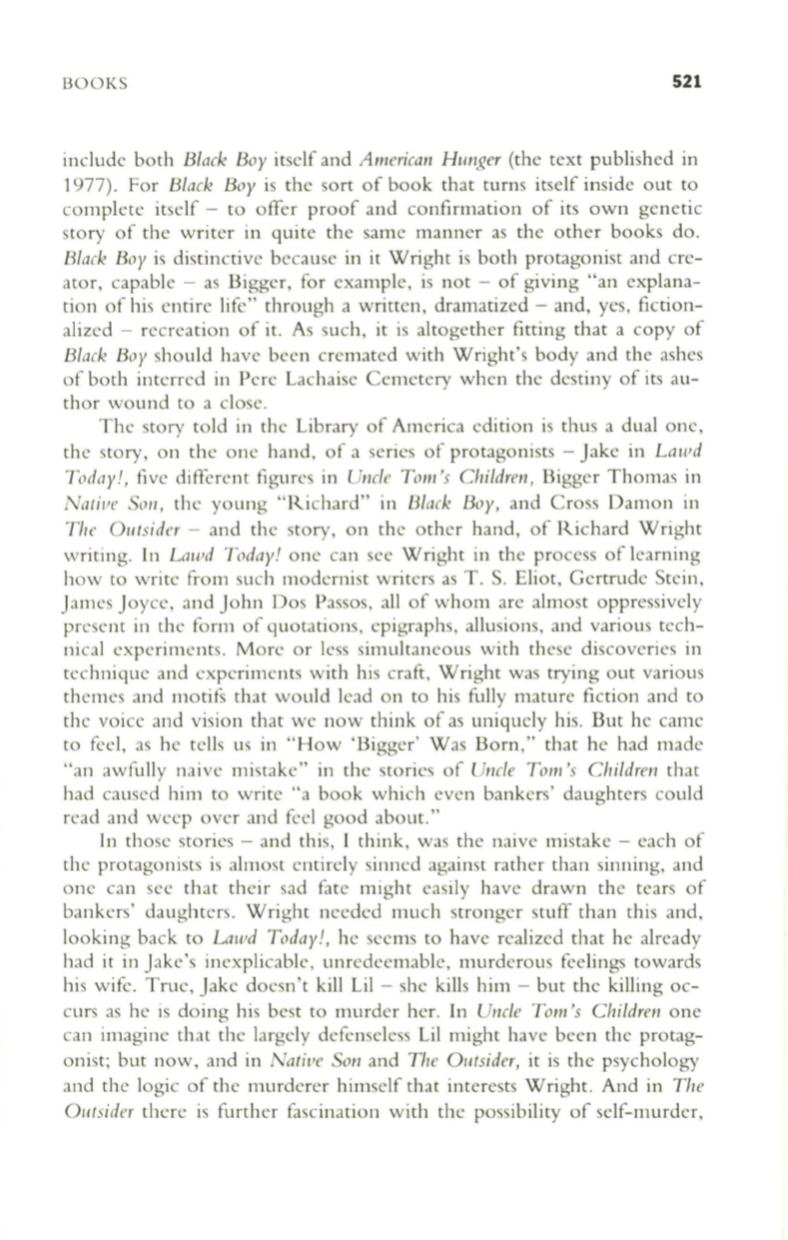
BOOKS
521
include both
Black Boy
itself and
American Hunger
(the text published in
1977). For
Black Boy
is the sort of book that turns itself inside out to
complete itself -
to
offer proof and confirmation of its own genetic
story of the writer in quite the same manner as the other books do.
Black Boy
is distinctive because in it Wright is both protagonist and cre–
ator, capable - as Bigger, for example, is not - of giving "an explana–
tion of his entire life" through a written, dramatized - and, yes, fiction–
alized - recreation of it. As such, it is altogether fitting that a copy of
Black Boy
should have been cremated with Wright's body and the ashes
of both interred in Pere Lachaise Cemetery when the destiny of its au–
thor wound to a close.
The story told in the Library of America edition is thus a dual one,
the story, on the one hand, of a series of protagonists - Jake in
Lawd
Today!,
five different figures in
Uncle Tom's Children,
Bigger Thomas in
Natille 5011,
the young "Richard" in
Black Boy,
and Cross Damon in
The Olltsider
-
and the story, on the other hand, of Richard Wright
writing. In
Lawd Today!
one can see Wright in the process of learning
how to write from such modernist writers as
T.
S. Eliot, Gertrude Stein,
James Joyce, and John Dos Passos, all of whom are almost oppressively
present in the form of quotations, epigraphs, allusions, and various tech–
nical experiments. More or less simultaneous with these discoveries in
technique and experiments with his craft, Wright was trying out various
themes and motifs that would lead on to his fully mature fiction and to
the voice and vision that we now think of as uniquely his. But he came
to feel, as he tells us in "How 'Bigger' Was Born," that he had made
"an awfully naive mistake" in the stories of
Uncle Tom's Children
that
had caused him to write "a book which even bankers' daughters could
read and weep over and feel good about."
In those stories - and this, I think, was the naive mistake - each of
the protagonists is almost entirely sinned against rather than sinning, and
one can see that their sad fate might easily have drawn the tears of
bankers' daughters. Wright needed much stronger stuff than this and,
looking back
to
Lawd Today!,
he seems to have realized that he already
had it in Jake's inexplicable, unredeemable, murderous feelings towards
his wife. True, Jake doesn't kill Lil - she kills him - but the killing oc–
curs as he is doing his best to murder her. In
Uncle Tom's Children
one
can imagine that the largely defenseless Lil might have been the protag–
onist; but now, and in
Natille Son
and
The Olltsider,
it is the psychology
and the logic of the murderer himself that interests Wright. And in
The
Olltsider
there is further fascination with the possibility of self-murder,


